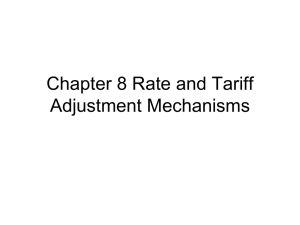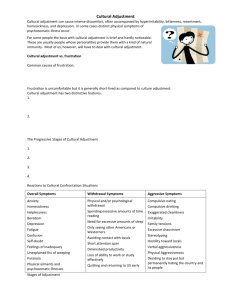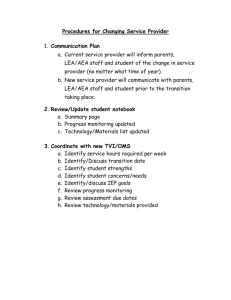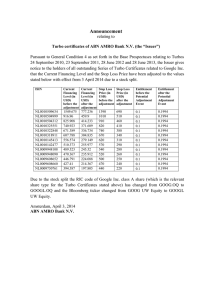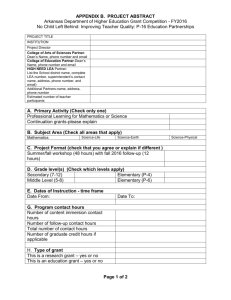maryland workforce development system
advertisement
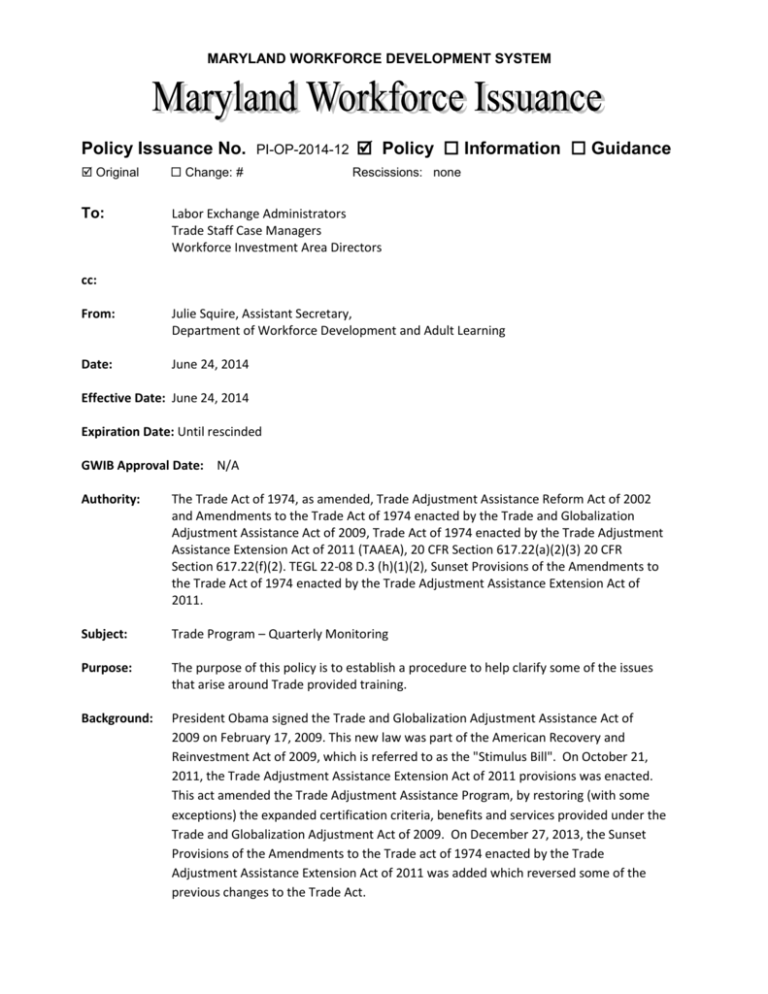
MARYLAND WORKFORCE DEVELOPMENT SYSTEM Policy Issuance No. PI-OP-2014-12 Policy Information Guidance Original Change: # To: Labor Exchange Administrators Trade Staff Case Managers Workforce Investment Area Directors Rescissions: none cc: From: Julie Squire, Assistant Secretary, Department of Workforce Development and Adult Learning Date: June 24, 2014 Effective Date: June 24, 2014 Expiration Date: Until rescinded GWIB Approval Date: N/A Authority: The Trade Act of 1974, as amended, Trade Adjustment Assistance Reform Act of 2002 and Amendments to the Trade Act of 1974 enacted by the Trade and Globalization Adjustment Assistance Act of 2009, Trade Act of 1974 enacted by the Trade Adjustment Assistance Extension Act of 2011 (TAAEA), 20 CFR Section 617.22(a)(2)(3) 20 CFR Section 617.22(f)(2). TEGL 22-08 D.3 (h)(1)(2), Sunset Provisions of the Amendments to the Trade Act of 1974 enacted by the Trade Adjustment Assistance Extension Act of 2011. Subject: Trade Program – Quarterly Monitoring Purpose: The purpose of this policy is to establish a procedure to help clarify some of the issues that arise around Trade provided training. Background: President Obama signed the Trade and Globalization Adjustment Assistance Act of 2009 on February 17, 2009. This new law was part of the American Recovery and Reinvestment Act of 2009, which is referred to as the "Stimulus Bill". On October 21, 2011, the Trade Adjustment Assistance Extension Act of 2011 provisions was enacted. This act amended the Trade Adjustment Assistance Program, by restoring (with some exceptions) the expanded certification criteria, benefits and services provided under the Trade and Globalization Adjustment Act of 2009. On December 27, 2013, the Sunset Provisions of the Amendments to the Trade act of 1974 enacted by the Trade Adjustment Assistance Extension Act of 2011 was added which reversed some of the previous changes to the Trade Act. Procedure: To ensure that elements of the Trade Program are being implemented appropriately, representatives from the Dislocation Services Unit (DSU) will conduct a quarterly review for a minimum of 20 active Trade files that include at least two certifications. The files will be randomly selected from files that are active on the Career Counselor’s case load. A date for the onsite file review will be coordinated with the appropriate Labor Exchange Administrator(s) (LEA). Once the review is conducted a written report will be generated and when finalized, the findings will be shared with the LEA(s) involved in the review. Promising practices and areas of concern will be identified. Where appropriate, the DSU staff will share the promising practices with other LEA(s) in order to improve the overall system of delivery of Trade services to impacted workers. In addition DSU staff will work with the appropriate LEA(s) to provide technical assistance to address areas of concern. Action Required By Local: (1) (2) (3) (4) (5) (6) (7) (8) (9) Files will be selected based on active customers in the Trade Program according to the Maryland Workforce Exchange. A list will be sent to the appropriate LEA(s) no more than two (2) business days in advance of scheduled review and selected files will be located in agreed upon location. If a selected file cannot be found, the worksheet will be completed as much as possible then marked with “File could not be located”. The accompanying worksheet should be completed for each file reviewed. The worksheet that matches the Trade number the individual was approved for must be filled out. The overall file layout will be reviewed to insure all files are kept in same manner and the layout is logical and orderly. Documentation required for Trade will be reviewed. Evidence of Trade petition approval, individual identity documentation, citizenship or legal guest worker documentation, layoff letter or layoff list identifying individual being laid off and date of most recent separation, eligible Veteran Status (if applicable), evidence of receiving public assistance if applicable, release of information of employment document completed, evidence individual is aware of services available under Trade Program must be in file. Evidence of enrollment in Trade Program must be in the file. Evidence of core services provided will be reviewed. Evidence of intensive services provided should be reviewed. An individual education plan must be developed or underdevelopment and should reflect the current status of the plan. If moving toward training the following must be in the file: Labor market information Research on training providers Evidence on research in to the field of study Evidence of academic ability Evidence of Training program (length, cost, outcome of training) Evidence that training program will provide the individual with what they need to enter or continue in the chosen field of work Training Approval of training up to current level If completed, evidence of completion Job Attainment Evidence that the individual obtained employment Follow up Evidence that follow-up after employment was conducted with the individual Once all required files are reviewed, a report will be generated by the Trade Unit. The report will be shared with the Labor Exchange Administrator for the section of the state covered by the review. In addition, information from the report will be utilized by the DSU to create training opportunities and promote promising practices, help all areas provide better service to Trade impacted individuals and ensure accurate recording of services. Inquiries: Scott Wallace (410) 767-2833 swallace@dllr.state.md.us Division of Workforce and Adult Learning 1100 N. Eutaw Street, Room 106 Baltimore, Maryland 21201
